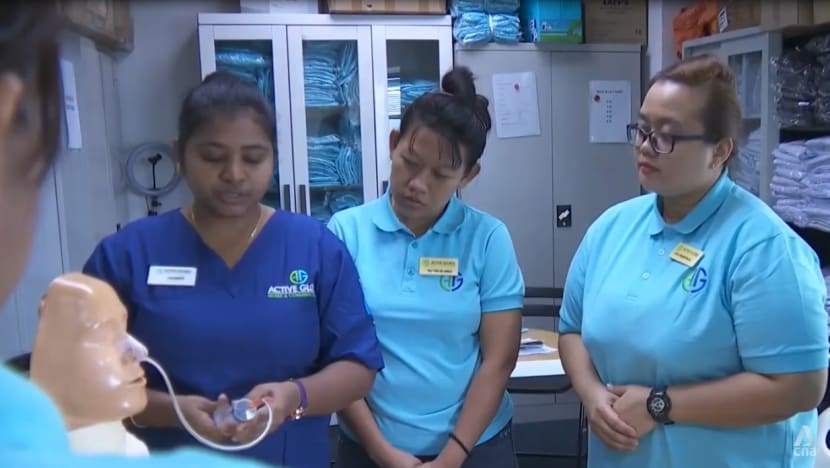‘Super-skilled’ domestic workers in Singapore earn 10% more pay as demand rises
As the country’s population ages, a growing generation of maids are learning new skills to get better pay and job prospects.

Domestic workers in Singapore receiving training from a certified nurse.

This audio is generated by an AI tool.
SINGAPORE: Ms Joselyn Rosete is not your ordinary migrant domestic worker.
The Filipina can recite the names of her employer’s medications for end-stage renal disease. Just after a few months of working in Singapore, she has also put together meal plans and a medical appointment roster.
She told CNA that she checks the elderly man’s blood pressure and blood sugar twice a day, and knows when the levels have reached “red flag” territory – thanks to her upskilling efforts in the Philippines.
The 44-year-old is among a growing generation of maids who are learning new skills to get better pay and job prospects.
Amid Singapore’s greying population, demand for such “premium” and “super-skilled” helpers has risen up to 30 per cent in the last few years, according to employment firms.
These firms also said that a third more employers have wanted to hire maids with paper qualifications or certified skills – like Ms Rosete – over the last few years.
These employers are even willing to pay 10 per cent more to secure their services. As domestic workers typically earn around S$500 (US$369) monthly, this means they are getting S$50 to S$100 more now.
OPTION OF SUNDAY CLASSES
At Homekeeper Maid Agency, domestic workers begin their eldercare training in their home countries. This lasts for two weeks to at least two months.
“We work with our trusted partners, be it Indonesia, Philippines or Myanmar - they follow our training crew requirements. We have developed our own assessment skills and training curriculum that we have (given to) several caregivers in Singapore,” said Homekeeper director James Yong.
The firm has improved their training materials by learning from hospitals and senior care agencies.
When helpers come over to Singapore, they will learn skills like general housekeeping, cooking and languages.
During a three-day training programme, they also pick up eldercare-specific skills like how to safely transfer the elderly from their bed to the wheelchair, spot an infection, and monitor blood pressure.
Beyond this, domestic workers can continue upskilling after they begin working with an employer.
They have the option of enrolling for Sunday classes taught by actual nurses for up to six months. Course fees are about S$300 and participants attain a certificate upon completion.
Mr Yong said that the course slots get taken up quickly, as maids will see their peers posting on social media about having a certificate.
“They have a very strong community base,” he noted.
After domestic workers finish the course, they typically want to move on to nursing after completing their contract, Mr Yong added.
“They'll move on to nursing or they'll come back to Singapore as an ex-helper, but with a higher level of knowledge.”
Orange Employment Agency has also received 20 per cent more customers looking for maids with specific skills, such as caring for those with dementia or Parkinson’s disease, in recent years.
The employment firm’s owner, Ms Shirley Ng, said that it helps employers to look for relevant training courses for their maid.
“The reason why I do not send them is because it's not practical and it's not economically viable, simply because the employers’ demands are very broad and varied,” Ms Ng added.
“It’s very difficult for me to send a helper to a specific course; I really do not know what the employers need. And on top of that, the helper actually can receive a caregivers training grant, which is available for eligible employers.”
This grant, administered by the Agency for Integrated Care, provides annual subsidies for eligible caregivers to attend approved courses from toilet training for young children to stroke patient care.
The grant amount is at least S$400, with yearly top-ups of S$200.


















